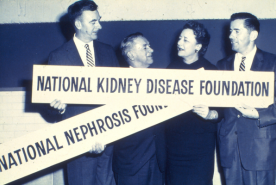 Medications save and improve lives, but it can be easy to overlook their risks and side effects, especially if you don't think they apply to you. Twenty-six million Americans have chronic kidney disease and most don't know it.
Medications save and improve lives, but it can be easy to overlook their risks and side effects, especially if you don't think they apply to you. Twenty-six million Americans have chronic kidney disease and most don't know it.
If you don't know how well your kidneys are working, you may not realize that certain medications could be damaging your kidneys and other parts of your body. Both prescription and over-the-counter medications are filtered by the kidneys. This means that your kidneys degrade and remove medications from the body.
When your kidneys aren't working properly, medications can build up and cause you harm. It's important to get your kidneys checked and to work with your doctor to make any adjustments to your medication regimen, such as dosing changes or substitutions. This will help prevent any negative effects from the medication, including further kidney damage.
You can determine your level of kidney function with a blood test for serum creatinine to calculate an eGFR measurement. An eGFR estimates how well your kidneys are filtering wastes from the blood.
The National Kidney Foundation encourages you to learn more about the health of your kidneys in order to protect these vital organs when taking medications. Always speak with your clinician and pharmacist to determine whether the medications that you're taking should be adjusted based on your kidney function. Only make changes to your prescription medications with the supervision of your trained medical practitioner. Ask questions and evaluate the risks and benefits based on your specific health needs.
Here are 5 common types of prescription and over-the-counter medications may need to be adjusted or replaced if you have kidney damage.
- Cholesterol medications. The dosing of certain cholesterol medications, known as "statins", may need to be adjusted if you have chronic kidney disease.
- Pain medications. If you have decreased kidney function some over-the-counter and prescription pain medications, including nonsteroidal anti-inflammatory drugs (NSAIDs), are not recommended because they can reduce blood flow to the kidneys. Certain narcotic pain medications can build up in the body and cause serious problems for patients with chronic kidney disease.
- Anti-microbial meds. Many anti-fungal, antibiotic and antiviral medications are cleared by the kidneys. It's important that you and your clinician are aware of your level of kidney function so that a kidney-safe medication can be prescribed for your treatment.
- Diabetes medications. Insulin and certain medications used by people with diabetes are cleared by the kidneys. Because diabetes is a leading cause of kidney disease, it's important that those with diabetes control their blood sugar levels. Blood sugar control typically involves a combination of diet, physical activity, and medication. If you have diabetes and chronic kidney disease, check with your physician to see if any dosing changes need to be made based on your level of kidney function.
- Upset stomach/antacid medications. This group of over-the-counter medications can disrupt the body's electrolyte balance if you have chronic kidney disease. Check with your doctor to see if these are safe for you to use.
For more information about medications that may need to be adjusted or avoided if you have chronic kidney disease, click here.








